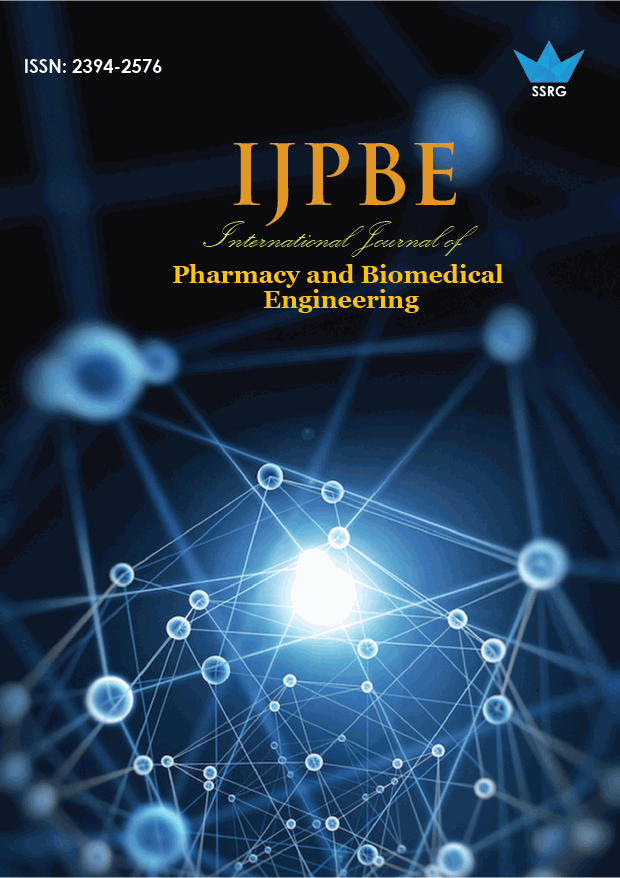Impact of Hormone Balancing Diet Therapy on Serum Estrogen and Menstural Cycle Length of Menopause Women

| International Journal of Pharmacy and Biomedical Engineering |
| © 2018 by SSRG - IJPBE Journal |
| Volume 5 Issue 3 |
| Year of Publication : 2018 |
| Authors : Kusuma Neela Bolla and Dr.Santhi Sri K.V |
How to Cite?
Kusuma Neela Bolla and Dr.Santhi Sri K.V, "Impact of Hormone Balancing Diet Therapy on Serum Estrogen and Menstural Cycle Length of Menopause Women," SSRG International Journal of Pharmacy and Biomedical Engineering, vol. 5, no. 3, pp. 1-5, 2018. Crossref, https://doi.org/10.14445/23942576/IJPBE-V5I3P101
Abstract:
Menopause is a natural physiological event of a women’s life. During this transition, women experience several menopause symptoms, especially abnormal menstrual cycles and other endocrine changes occurs due to lack of female hormones: estrogen and progesterone. Isoflavones are phytoestrogens present abundant quantities which are biosynthesized in plants like soybean behave as mammalian estrogen, binds to the estrogen receptors and acts on the target cells and functions had a beneficial effect of Quality of life. In the present study, hormone balancing soy-based diet is formulated and analyzed its impact on anthropometric(body weight, waist-hip ratio), serum estrogen and menstrual cycle length. Clinical practices of this formulation helped hormones relief and resulted in significant differences(P<0.05) in body weight, WHR, serum estrogen levels and menstrual cycle length in the experiment group. Nutritional therapy enriches the hormones and enhances the Quality of life during and after the menopause transition.
Keywords:
Menopause, hormone-balancing diet, estrogen, menstruation
References:
[1] Aedin Eassidy and Marian Faughnan The Nutrition Society Medal Lecture: Phyto estrogen through the life cycle proceedings of the Nutrition society (2000); 59,489-496J.
[2] A Bakhtiari, Z Yassin, P Hanachi, A Rahmat, Z Ahmad, P Sajadi, S Shoja ei, “Effect of soy on Body Composition: A 12- week Randomized controlled trial among Iranian Elderly Women with Metabolic Syndrome”. Iranian J Publ Health, Vol 41, No. 4, Apr 2012, pp. 9-18.
[3] Alderceutz H, Mazur. “Phytoestrogens and western diseases”. Ann med 1997; 29: pp no:95-120.
[4] Breckwoldt, M.Keck C & Karok U (1995) “Benefits and risks of hormone replacement therapy”. J Steriod Biochem. Mol. Biol:53: pp no:205-203.
[5] Chisato Nagata, Naoyoshi Takatsuka, Shizuyo Inaba, Norito Kawakami, Hiroyuki shimizu. “Effects of soy milk consumption on serum estrogen concentrations in premenopausal Japanese women”. Journal of the National Cancer Institute, Vol. 90. No. 23, December 2, 1998
[6] Nagi B. Kumar, Alan cantor, Kathy Allen, Diane Riccardi Charles E.Cox. “The specific role of isoflavones on estrogen metabolism in premenopausal women”. American cancer society, 2002, vol:94(4), pp:1166-1174.
[7] C-J Chang, C.H Wu, Yao, Y-C Yang, J-S Wu and F-H Lu. “Relationship of age, menopause and central obesity on cardiovascular diseases risk factors in Chinese women”. IJO 2000, 24, pp no:1699-1704.

 10.14445/23942576/IJPBE-V5I3P101
10.14445/23942576/IJPBE-V5I3P101